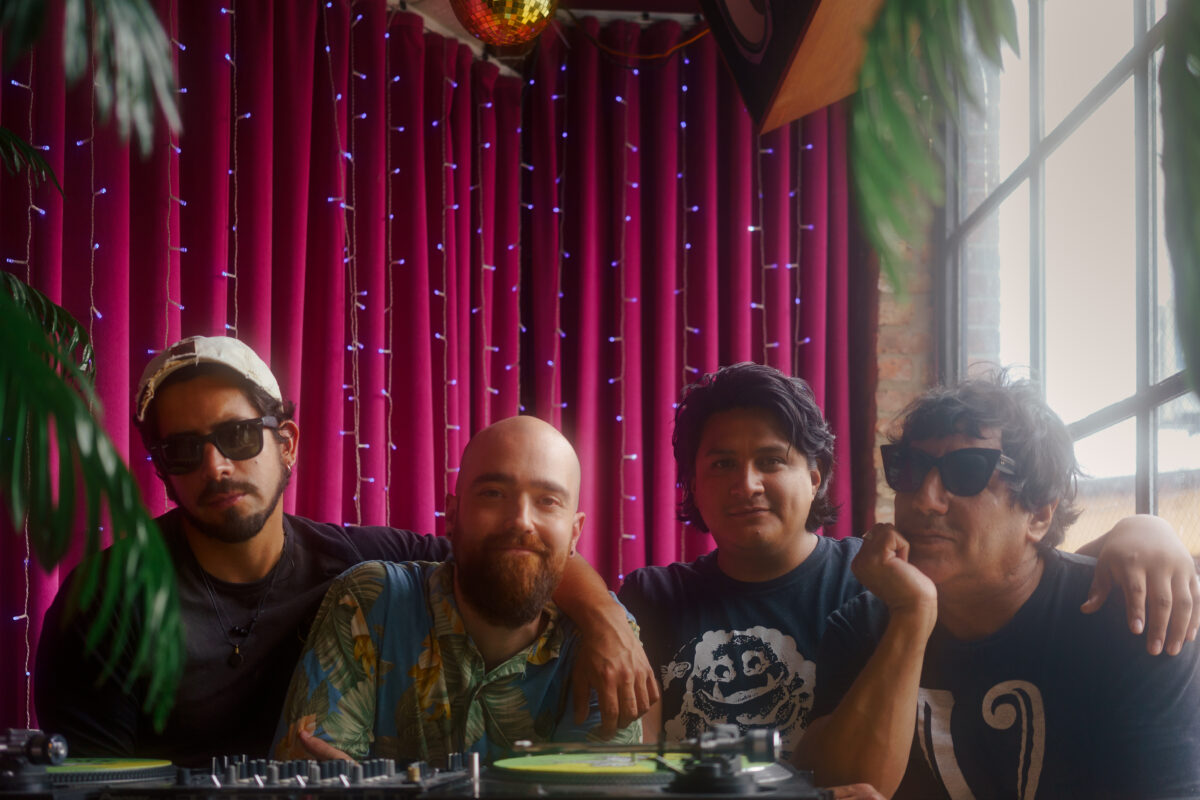A warm, humid breeze blew through the triangle-shaped bar Estereo, which was illuminated only by the midday sun. It felt like someone had ripped a bar out of Havana or Bogotá and dropped it off in the middle of Chicago. The same could be said of the members of Cabeza De Chivo, who draw from their Latinx roots to create a freewheeling psychedelic experiment in Latin musical genres.
The band consists of Alex Aguayo on drums, Andrés Crovetti on bass, Jesse Villalobos on guitar, and Vee Sonnets on keys and guitar. Together they were reminiscing over drinks about their first Wicker Park Fest performance this year.
“I felt like it was very emblematic of the group,” Crovetti said. “We were ripping it.”
“The crowd was awesome and engaging,” Aguayo said. He added that because “music is a bridge of cultures, you don’t have to speak Spanish to feel the music.”
While Cabeza De Chivo’s sound has been compared to cumbia, a folkloric genre from Colombia, they describe themselves as a tropical-psych band. “That’s the first thing that people know. It helps them understand what we’re doing,” Aguayo said. A Chivo song might start as a fast-paced merengue but transition to a trippy salsa by the end of the performance. Sonnets points out that they also “throw in a lot of Jamaican rhythms, like rocksteady or reggae or ska.” Chivo has performed at venues like Thalia Hall, Empty Bottle, and Mole de Mayo. This year they’ve released three singles, their latest dropped on August 23 on all major streaming platforms.
The band is also emblematic of the best of Chicago. Chivo was only possible because of the diversity the city has to offer. “I grew up listening to so much music in Albany Park. It was considered one of the most diverse neighborhoods in the country,” Villalobos said. The mix of cultures exposed each bandmate to different influences. While all band members are Latino, they are able to pull from their Ecuadorian, Venezuelan, and Mexican roots. Villalobos also said that playing in Cabeza De Chivo has brought him “closer to other people’s ideas of music.” In the same way the group bridges genres, they hope their music can be a vehicle for others to discover new cultures and sounds like it has been for them.
Cabeza De Chivo was born in 2019 at the Rainbo Club, a dive bar off Damen and Division Street. Aguayo and Villalobos were catching up and bonding over Latin albums like those by Los Pirañas. Both were lifelong friends who forged their friendship through years of playing together in Chicago’s local music scene.
While Villalobos was playing in a couple of bands at the time, Aguayo had taken a long hiatus and was itching to play again. Something was calling him to reignite his passion for music with a newfound commitment. “We felt like there was no Latino representation,” said Aguayo.
They recruited Sonnets, a classically trained musician and veteran of the local scene, to help accomplish their vision. Initially, he was reluctant to join. Sonnets only remembered Aguayo and Villalobos as young, immature musicians. “They were like feral cats,” he said. After some convincing from a mutual friend named Chase Madulara, he decided to check out what they had made.
Sonnets was blown away. “I just sat there going, holy shit, this is good.”
Originally Madulara was on bass, but he left the project to pursue flight school in Florida. Eventually, Crovetti, who was in the Milwaukee music scene and would frequent Chivo shows, approached the band through a mutual friend. He ended up being a perfect fit. “They opened for a friend of mine…and then I saw Jesse, and I was like, wait a minute, I think I might know who these cats are,” Crovetti said.
After playing together for three years, “it feels like we’re all drummers, like everyone has a really deep rhythmic feel,” Crovetti said. The instruments become the song’s vocals, taking turns speaking to each other, coming to the forefront and dipping back. “Everybody’s shining in their own time in their own space,” Sonnets said.
While most of their music is instrumental, one song stands out in their catalog: “Perdido.” Originally the song started as an instrumental, until Aguayo wrote some lyrics about being lost, which fit naturally with the song’s melody. “Perdido” can also be about being lost in “sexuality, depression, anything—that’s a universal feeling,” Sonnets added.
“Perdido” also has a more personal meaning. Aguayo’s main intention with the lyrics was to touch on themes of migration. “That’s why we sing ‘from the north to south, they will always lie to you,’’’ he said. When he wrote the song, “a lot of migration problems were going on.” The band pointed out how many in Chicago’s Latinx community know someone who has migrated to the city from Latin America and has faced struggles on their journey. “I migrated here when I was seventeen. . . my story’s different from everyone else, but everyone has their story,” said Aguayo. “I think it was an important topic, especially to play live.”
Just as Cabeza De Chivo bridges musical genres, they hope to help their audience bridge cultures through their music. “Perdido” is about that sentiment. Not feeling like you belong here or there. And rather just wanting everybody to feel included and like they have a place to be,” Crovetti said.
Aguayo added, “at the end of the day, I hope you find that safe place—I hope you find that place where you feel yourself.”
Jesús G. Flores is a Latino multimedia journalist from Hegewisch. He mostly covers Latinx subcultures and previously covered the brother-sister punk band SKIN for the Weekly.

